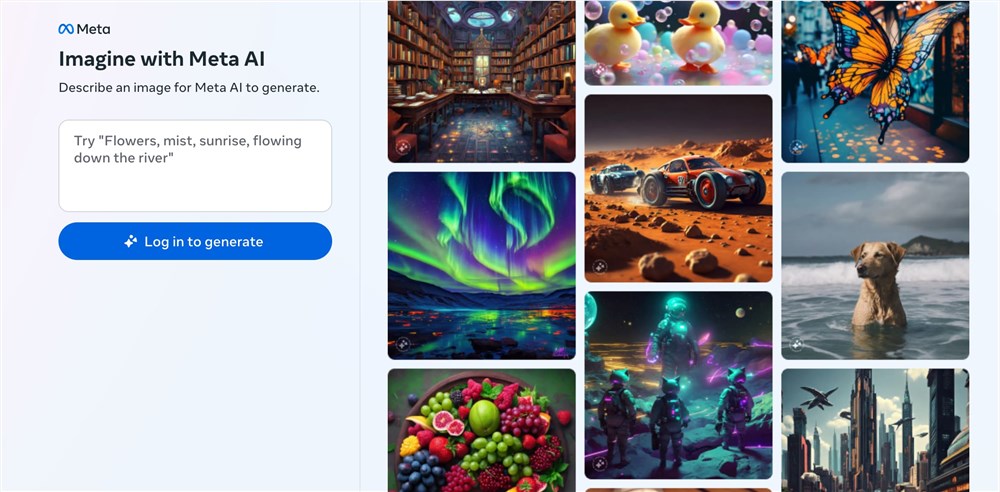Meta Launches Free Standalone AI Image Generator Website 'Imagine with Meta AI'
-
After Google launched Gemini, Meta has also stepped up by introducing a free standalone AI image generator website based on its Emu image synthesis model—Imagine with Meta, which allows users to generate images through natural language descriptions.

Imagine with Meta AI website screenshot
Meta used 1.1 billion publicly visible photos from Facebook and Instagram to train this AI model, which can render new images based on text prompts. Previously, Meta's technology—using the same data—was only available in apps like Instagram's messaging and social networking features.
If you use Facebook or Instagram, chances are your photos (or photos you took) helped train Emu. In a way, the old saying 'if you're not paying, you're the product' has taken on a whole new meaning. While Instagram users uploaded over 95 million photos daily as of 2016, the dataset Meta used to train its AI model is only a small fraction of its overall photo library.
Meta states that it only uses publicly available photos for training, so setting your Instagram or Facebook photos to private should prevent them from being included in the company's future AI model training (unless it changes this policy, of course).
Imagine with Meta AI
「Imagine with Meta AI」is similar to Stable Diffusion, DALL-E 3, and Midjourney, generating new images based on visual concepts learned by AI models from training data. Using this new website to create images requires a Meta account, which can be imported from an existing Facebook or Instagram account. Each generation produces four 1280×1280 pixel images that can be saved in JPEG format. The images include a small 'Imagined with AI' watermark in the bottom left corner.
Meta stated in its press release: "We're excited to hear how people are using imagine to create fun and creative content, imagine being Meta AI's text-to-image generation feature. Today, we're expanding access to imagine beyond chats, first launching imagine.meta.com in the U.S. This standalone experience is designed for creative enthusiasts, allowing you to create images using technology from Emu."
Meta's model generally performs well in creating realistic images, though not as well as Midjourney. It can handle more complex prompts than Stable Diffusion XL, but perhaps not as effectively as DALL-E 3. It struggles with text rendering, and the results vary across different media outputs like watercolor, embroidery, and ink drawings. The model does show diversity in generating images of people from various racial backgrounds. Overall, it seems to be average in the current landscape of AI image synthesis.
Facebook and Instagram Make This Possible
So, what do we know about Emu—the AI model behind Meta's new AI image generation feature? According to a research paper released by Meta in September, Emu gains its ability to generate high-quality images through a process called "quality tuning." Unlike traditional text-to-image models trained on vast datasets of image-text pairs, Emu focuses on "aesthetic alignment" after pre-training, using a relatively small but visually appealing set of images.
However, the core of Emu remains the massive pre-training dataset of 1.1 billion text-image pairs extracted from Facebook and Instagram, as mentioned earlier. In the Emu research paper, Meta did not specify the exact source of the training data, but reports from the Meta Connect 2023 conference cited Meta's Global Affairs President Nick Clegg as saying that they are using social media posts as training data for AI models, including the images fed into Emu.
This is where Meta differs from other AI companies, as Meta has access to vast amounts of image and caption data from its services. Other image synthesis models use images scraped illegally from the internet, licensed images from commercial galleries, or a combination of both.
Interestingly, Meta's research paper on Emu is the first we've seen about a major image synthesis model that does not declare the possibility of the model creating distorted, false information or potentially harmful content. This reflects the general acceptance (or resignation) of AI image synthesis models, which are now becoming more commonplace. Whether this is a good thing remains an open question.
Despite this, Meta appears to be addressing the issue of potentially harmful outputs through filters, a proposed watermarking system that is not yet operational (the company stated: "In the coming weeks, we will add invisible watermarks to the imagine with Meta AI experience to enhance transparency and traceability"), and a small disclaimer at the bottom of the website: "Images may be inaccurate or inappropriate."
These images may be inaccurate or even unethical in the eyes of the unnamed 1.1 billion image authors whose works were used to train the model. But we dare say: generating these images can be fun. Of course, depending on your attitude and your views on the speed of AI image synthesis, this fun might be offset by an equal measure of concern.
